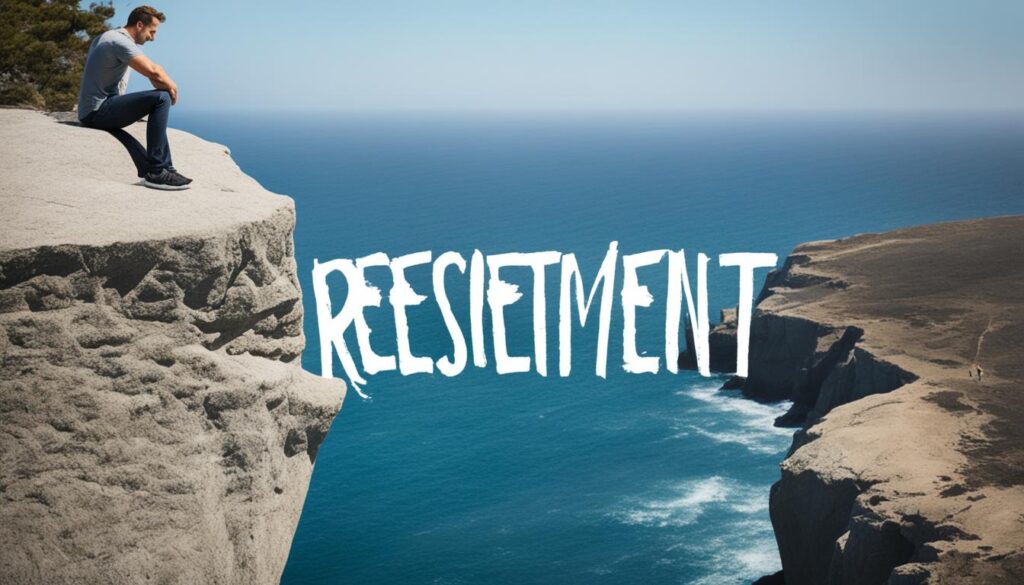Resentment is a powerful emotion that can weigh heavily on our hearts and minds. It can consume us, filling us with anger, bitterness, and a sense of injustice. But what if there was a way to release the burden of resentment and find peace within ourselves?
In the words of Buddha, “Holding onto anger is like drinking poison and expecting the other person to die.” This profound quote reminds us that holding onto resentment only harms ourselves, not the one who has wronged us. It is a call to let go and find liberation from the chains of resentment.
In this article, we will delve into the teachings of Buddhism to discover strategies for releasing resentment and embracing forgiveness. Drawing from the wisdom of mindfulness and compassion, we will explore how to free ourselves from the grip of resentment and cultivate inner peace.
Key Takeaways:
- Resentment can have a detrimental impact on our well-being and relationships.
- Identifying the causes of resentment is key to addressing and releasing it effectively.
- Practicing empathy and seeking support are essential steps towards forgiveness.
- Mindfulness and compassion play a crucial role in letting go of resentment and finding inner peace.
- Letting go of resentment is a transformative journey that requires self-reflection and commitment.
Understanding Resentment: What It Is and What Causes It
Resentment is a complex emotion that encompasses anger, bitterness, indignation, and sadness. It arises when we feel that we have been treated unfairly or devalued. Common causes of resentment include experiencing repeated criticism, betrayal, or emotional abuse. Resentment can also stem from unmet needs and the perception of being treated in a way that deprives us of our entitlements. It is important to identify the source of our resentment to address and release it effectively.

The Impact of Resentment: Effects on Relationships and Well-being
Holding onto resentment can have a significant impact on your relationships and overall well-being. When you hold a grudge, it creates a negative cloud that hovers over your interactions with others. Resentment can lead to anger, hostility, and, over time, it can erode trust and intimacy in your relationships. It becomes challenging to communicate effectively when resentment taints your interactions, which may result in misunderstandings and further exacerbate the issues at hand.
But the effects of holding a grudge go beyond just relationships. Resentment can take a toll on your mental and physical health. The negative emotions associated with resentment, such as anger, bitterness, and sadness, can contribute to symptoms of depression, anxiety, and chronic stress. Research has also shown that holding onto resentment can negatively impact cognitive function, making it harder to focus, problem-solve, and make rational decisions.

Table: Effects of Holding a Grudge
| Effect on Relationships | Effect on Well-being |
|---|---|
|
|
It is crucial to understand the consequences of resentment in order to take proactive steps towards healing and forgiveness. By releasing resentment, you can improve your relationships, enhance your mental well-being, and regain control over your life.
But how do you let go of resentment? In the next section, we will explore strategies for forgiveness and provide you with practical tools to release the grip of resentment on your heart and mind.
Letting Go of Resentment: Strategies for Forgiveness
Letting go of resentment requires intentional effort and a commitment to change. It is a process that involves acknowledging our emotions, recognizing the harm done to us, and working to release the negative feelings associated with it.
Here are some strategies and steps to help you embark on the journey towards forgiveness:
- Practice Empathy: Put yourself in the shoes of the person who caused you harm. Try to understand their perspective, motives, and struggles. This can help cultivate empathy and compassion, making it easier to let go of resentment.
- Seek Support: Consider reaching out to a counselor or joining a support group. Talking with someone who can provide guidance and a safe space to express your feelings can be immensely helpful in the process of forgiveness.
- Choose Forgiveness: Make a conscious decision to forgive the person who caused the harm. Understand that forgiveness is not condoning their actions but is a choice to let go of resentment and find inner peace.
Remember, forgiveness is a personal journey, and it may take time to fully let go of resentment. Be patient and kind to yourself throughout the process.
Celebrity Insights: Oprah Winfrey on Forgiveness
“True forgiveness is when you can say, ‘Thank you for that experience.'” – Oprah Winfrey

| Benefit of Forgiveness | Effect |
|---|---|
| Improved Mental Health | Reduction in symptoms of depression, anxiety, and stress |
| Enhanced Relationships | Improved communication, rebuild trust, and deepen connection |
| Increased Happiness | Greater sense of inner peace and emotional well-being |
In summary, letting go of resentment and achieving forgiveness is a transformative process that requires empathy, support, and a conscious choice to release negative feelings. By embracing these strategies, you can embark on a journey towards healing and find peace within.
The Power of Mindfulness and Compassion in Releasing Resentment
Resentment can be a heavy burden to carry, weighing down our spirits and hindering our ability to find peace. However, by embracing mindfulness and compassion, we can begin to release the grip of resentment and cultivate forgiveness.
Mindfulness, a key practice in Buddhism, allows us to observe our thoughts and emotions without judgment. It invites us to bring our attention to the present moment, where we can gain insight into the roots of our resentment. Through mindfulness, we develop a deeper understanding of our own suffering and the suffering of others, fostering empathy and compassion.
Compassion plays a vital role in the process of releasing resentment. By extending compassion towards ourselves, we acknowledge our own pain and grant ourselves the permission to heal. We recognize that holding onto resentment only perpetuates our own suffering, and so we choose to cultivate forgiveness as an act of self-care.
Additionally, compassion towards others allows us to see beyond their actions and circumstances, acknowledging that we are all fallible beings. This understanding helps us break the cycle of resentment and creates space for forgiveness to take root.
Integrating mindfulness and compassion techniques into our daily lives empowers us to develop a new perspective on resentment. It provides us with the tools to let go of anger and bitterness, replacing them with peace and inner freedom.
To further explore the power of mindfulness and compassion in releasing resentment, take a moment to reflect on the following techniques:
- Self-Compassion: Practice self-compassion by treating yourself with kindness and understanding. Acknowledge your own pain and suffering, and offer yourself forgiveness and acceptance.
- Loving-Kindness Meditation: Engage in loving-kindness meditation, directing well-wishes and compassion towards yourself and others. This practice helps cultivate empathy and build bridges towards forgiveness.
- Non-Judgmental Awareness: Develop non-judgmental awareness of your own thoughts and emotions. When resentment arises, observe it without attaching judgment or criticism. This mindful observation can help weaken its hold on you.
- Gratitude Practice: Cultivate a sense of gratitude for the positive aspects of your life. Focusing on gratitude can shift your perspective and promote forgiveness by reminding you of the abundance around you.
By embracing mindfulness and compassion, we can navigate the path towards releasing resentment and fostering forgiveness. It is a journey that requires patience and practice, but the rewards are immeasurable. Let go of the burden of resentment and allow yourself to experience the transformative power of peace and inner freedom.

Conclusion
Coping with resentment and finding tools for resentment relief is a transformative journey that requires conscious effort and a willingness to let go. By recognizing the impact of resentment on our relationships and well-being, we can take the necessary steps towards healing and forgiveness.
One of the most powerful tools for coping with resentment is self-reflection. Take the time to examine your emotions, identify the root causes of your resentment, and understand how it may be impacting your life. By gaining insights into your own feelings and experiences, you can begin to release the grip of resentment.
Another essential tool for resentment relief is empathy. Cultivating empathy towards yourself and others can help you develop a deeper understanding of the pain and struggles that may have contributed to the resentment. By putting yourself in someone else’s shoes, you can foster compassion and forgiveness as you navigate the path towards letting go.
Remember that letting go of resentment is a process that requires patience and commitment. It may not happen overnight, and you may face setbacks along the way. However, by embracing forgiveness, practicing self-care, and seeking support from loved ones or professionals, you can find the strength to overcome resentment and experience the profound liberation of inner peace and healing.
FAQ
What is resentment?
Resentment is a complex emotion that encompasses anger, bitterness, indignation, and sadness. It arises when we feel that we have been treated unfairly or devalued.
What causes resentment?
Common causes of resentment include experiencing repeated criticism, betrayal, or emotional abuse. Resentment can also stem from unmet needs and the perception of being treated in a way that deprives us of our entitlements.
What are the effects of holding onto resentment?
Holding onto resentment can lead to anger, hostility, and a breakdown in communication. It can also cause symptoms of depression, anxiety, and stress. In addition, research has shown that holding onto resentment can negatively impact cognitive function and physical health.
What are some strategies for letting go of resentment?
Strategies for letting go of resentment include practicing empathy, seeking support from a counselor or support group, and choosing to forgive the person who caused the harm. It is important to understand that forgiveness does not necessarily mean reconciliation and that it is a personal journey of healing.
How can mindfulness and compassion help in releasing resentment?
Mindfulness allows us to observe our thoughts and emotions without judgment, creating space for self-reflection and understanding. Compassion, both towards ourselves and others, helps cultivate empathy and forgiveness. By integrating mindfulness and compassion practices into our lives, we can develop the tools to let go of resentment and replace it with peace and inner freedom.

